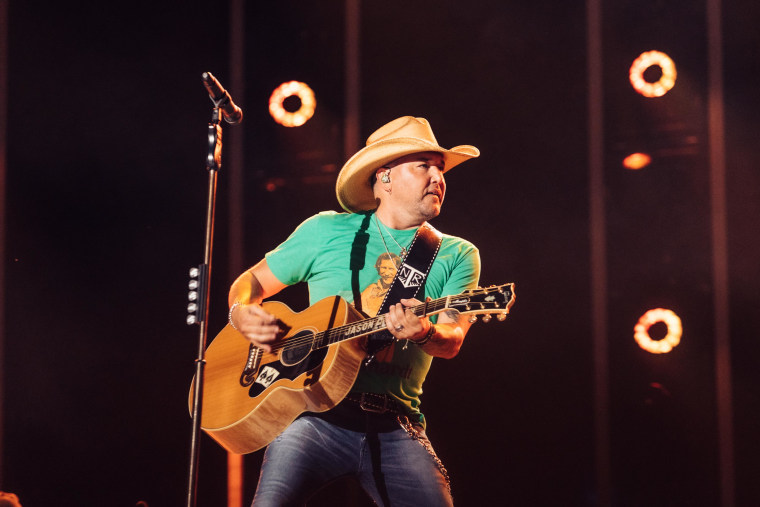Jason Aldean defended his controversial song, "Try That In a Small Town," at a Cincinnati concert July 21 to the support of fans who chanted "U.S.A" from the crowd.
Before he performed the single, he gave a speech about the track.
He opened with, "It's been a long-ass week," in clips shared on social media. While "Try That In a Small Town" was first released in May, the music video, which dropped July 14, stirred backlash, with critics saying the song encourages violence.
"I’ve seen a lot of stuff suggesting I’m this, suggesting I’m that,” Aldean said. “I feel everybody’s entitled to their opinion. You can think something all you want to, it doesn’t mean it’s true."

"What I am, is a proud American. I'm proud to be from here. I love our country," he continued. "I want to see it restored to what it once was before all this bulls---started happening to us. I love my country. I love my family. And I will do anything to protect that."
The crowd then began to shout "U.S.A" as he continued his introduction of the song, attributing the online backlash to "cancel culture."
"If people don’t like what you say, they try to make sure they can cancel you, which means try to ruin your life. Ruin everything," Aldean said in the speech, before thanking fans for sticking behind him.
"One thing I saw this week was a bunch of country music fans that can see through a lot of the bulls---. I saw country music fans rally like I’ve never seen before and it was pretty bada-- to watch, I gotta say. Thank you guys so much," he said.
Grover Collins, who attended the concert, posted a video of the speech on TikTok.
Last week, CMT pulled the music video for "Try That In A Small Town" from its rotation. The video includes footage of protests at a courthouse in Columbia, Tennessee, the same site where an 18-year-old Black man named Henry Choate was lynched in 1927.
Interest in the track increased, with the song reaching No. 1 on iTunes July 18, per Billboard. The song was written by Kurt Allison, Tully Kennedy, Kelley Lovelace and Neil Thrasher.
Supporters of Aldean, including many people who commented on the TikTok post, describe the song as patriotic and representative of how people feel in rural communities.
"Jason once again you never disappoint! ... gave me goosebumps because I lived my whole life in a small town," one person commented.
"I love this song and what it stands for; supporting your community and kids from outsiders," another wrote.
However, its lyrics about gun ownership and a threatening undertone, including the chorus, "Try that in a small town / See how far you make it down the road / Around here we take care of our own," has led many to say it promotes violence.
Sheryl Crow denounced the song, writing in a tweet, “There’s nothing small-town or American about promoting violence. You should know that better than anyone having survived a mass shooting. This is not American or small town-like. It’s just lame.”
Tennessee state Rep. Justin Jones also voiced his disapproval of the song on Twitter.
“As Tennessee lawmakers, we have an obligation to condemn Jason Aldean’s heinous song calling for racist violence,” he said. “What a shameful vision of gun extremism and vigilantism. We will continue to call for common sense gun laws, that protect ALL our children and communities.”
Aldean previously defended the song on social media July 18, saying the track "refers to the feeling of a community that I had growing up, where we took care of our neighbors, regardless of differences of background or belief."
"In the past 24 hours I have been accused of releasing a pro-lynching song (a song that has been out since May) and was subject to the comparison that I (direct quote) was not too pleased with the nationwide BLM protests. These references are not only meritless, but dangerous. There is not a single lyric in the song that references race or points to it- and there isn’t a single video clip that isn’t real news footage -and while I can try and respect others to have their own interpretation of a song with music- this one goes too far," Aldean said in the statement.
